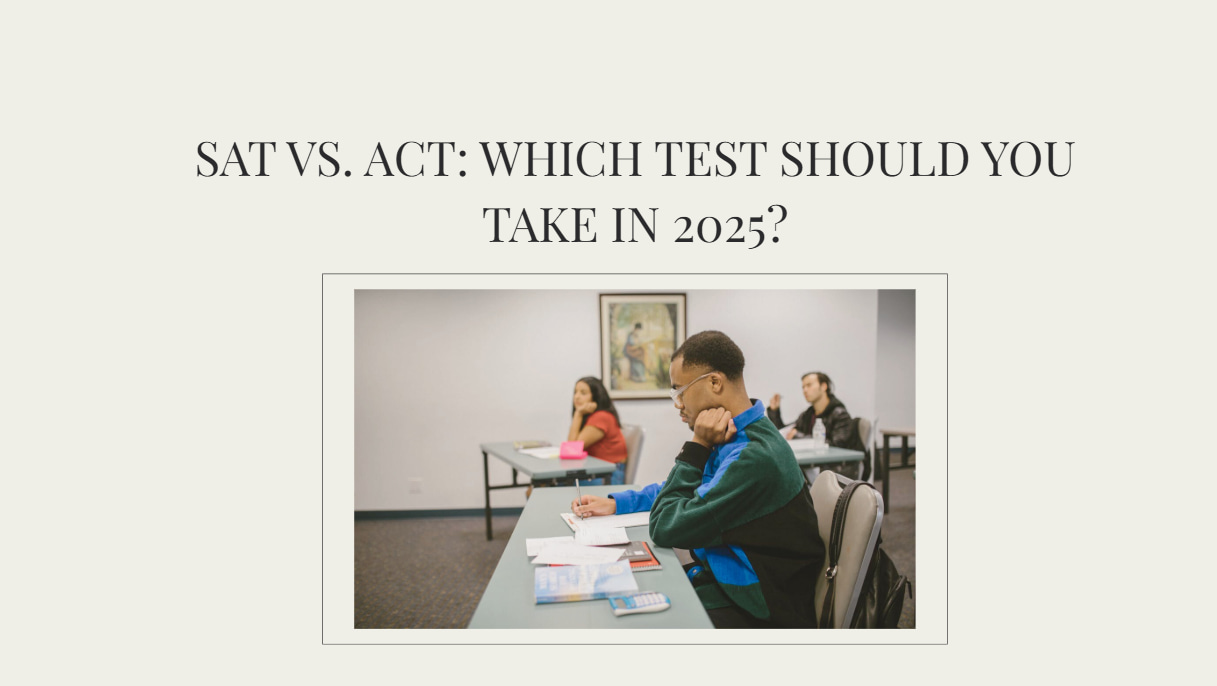An important question that many students ask me as a college admissions advisor is, “SAT vs. ACT: which is easier?” Moreover, many teachers also argue about it. Furthermore, students do want to know the answer since tests have a big impact on their applications. However, the real question isn’t which test is easy, but which one fits your style and skills.
I’ve seen students do great on the SAT but poorly on the ACT over the years, and the other way around, too. That’s why I’m here to explain everything to you.
What Is the SAT (Scholastic Assessment Test)?
The SAT is a standardized exam widely used for college admissions in the United States. This test puts a lot of weight on reasoning, solving problems, and being able to analyze complex texts. I think it’s more of a test of how well you can think strategically than a race against time.
By the way, the SAT gives you a little more time between questions than the ACT, which can be helpful if you like to take a few extra seconds to check your work.
Reading, writing, and language, as well as math, are the three key areas of the test. Each part tests the basic skills you’ve been working on since high school. This is what the SAT includes.
- Reading. Readings from books, newspapers, and scientific pieces, along with questions that test your ability to understand and think critically about them.
- Writing & Language. Editing and improving writing texts is a way to test your grammar, spelling, and persuasive skills.
- Math. There are two parts, one with a calculator and one without. The parts with calculator focus on algebra, solving problems, and some more advanced math concepts.
Your reading, writing, and math points are added together to get your SAT score, which may be anywhere from 400 to 1600.
In my experience, students find it simpler to grasp how they did compared to national percentiles when they use this scoring method. Also, the way the SAT is set up is good for students who want to think over issues rather than race through straightforward questions.
What Is the ACT (American College Testing)?
The ACT is another major standardized test used for admissions to US colleges and universities. Instead of a test of pure reasoning, it feels like a test of endurance and time management to me. The ACT is often appealing to students who can quickly process information and stay focused when they are under a lot of stress.
The ACT has four primary parts: English, Math, Reading, and Science. There is also an optional Writing (essay) part. Also, it doesn’t have distinct math sections for calculator and no-calculator, as the SAT does. You may use a calculator for the whole test.
The whole ACT test format is broken down below:
- English. Concentrates on grammar, sentence structure, punctuation, and how to use language effectively. You’ll revise and enhance sections, which is like the writing part of the SAT but with additional questions.
- Math. It includes algebra, geometry, and trigonometry, and has simple problem-solving challenges that require rapid calculations.
- Reading. It has four paragraphs from various disciplines that test your understanding and how fast you can retrieve information.
- Science. It doesn’t test your pure science knowledge; it tests how well you can understand data, graphs, and scientific reasoning.
- Writing Section (optional). A 40-minute essay in which you look at a prompt and make a persuasive argument for it.
Your total ACT score is the average of your scores on the four main parts. The scale ranges from 1 to 36. I’ve seen that students who like straightforward, less “tricky” questions and who can work under pressure usually do better on the ACT than on the SAT.

Which Is Easier: ACT or SAT?
There isn’t a single answer that works for everyone. As a college admissions counsultant, I can say that the test that seems “easier” to you relies on your skills, how well you can time yourself, and how you normally take tests.
Some students do better on the ACT because they like questions that are clear and to the point. Others find the SAT less stressful because each question has a little more time, and the test is more about logic than speed.
To answer “ACT vs. SAT: which is easier?”, you have to look at the core differences between the tests. So, here is a quick comparison of SAT and ACT:
| Feature | SAT | ACT |
| Sections | Reading, Writing & Language, Math (with and without calculator) | English, Math, Reading, Science, Optional Essay |
| Total Score | 400 – 1600 (sum of two sections) | 1 – 36 (average of four sections) |
| Math Content | Algebra I & II, Geometry, Trigonometry (limited) | Algebra, Geometry, Trigonometry (more advanced questions) |
| Science Section | No separate section | Yes (focuses on data analysis and interpretation) |
| Timing | 3 hours (no essay) | 2 hours 55 minutes (no essay) |
| Question Style | More reasoning and problem-solving | More direct and knowledge-based |
| Testing Pace | Fewer questions, more time per question | More questions, less time per question |
From my perspective, if you’re great with data interpretation and can think on your feet under time pressure, the ACT might feel more natural. And if you prefer more time to reason through questions or dislike the idea of a science section, the SAT might be your choice.
Should You Take the SAT or ACT in 2025?
Students often ask me whether they should take the SAT or the ACT to boost their chances of admission. Both exams are accepted by almost every college, but the key differences between the SAT and ACT can make one a better choice for you.
From my experience, the best test is the one that highlights your strengths and aligns with your study habits. Let’s take a closer look at how you can decide which test is right for you.
🔍 Understand All the Differences
The SAT, managed by the College Board, focuses on reading and writing skills combined with problem-solving math questions. Meanwhile, the ACT has a science section and slightly faster pacing, which can be challenging for some students. The ACT offers a composite score from 1 to 36, while the SAT is scored from 400 to 1600.
So, if you prefer one test over the other, it’s usually because the structure feels more natural for you.
📝 Try a Practice Test First
The easiest way to decide which test suits you is to take a practice test for both exams. A practice test gives you a realistic sense of the timing, question types, and difficulty levels.
In my experience, this single step can instantly show which exam feels like the best test for your strengths.
📚 Consider Your Test Prep Style
Your test prep strategy matters. Some students like preparing for the SAT because of its focus on critical thinking and fewer sections. Others prefer to take the ACT because it rewards quick, straightforward answers. Think about which prep style works best for your study habits.
📅 Look at the Test Date Options
Both the SAT and ACT have multiple national test dates throughout the year.
For example, the SAT often has test dates in spring 2025, including April 2025, while the ACT may offer an early session around the same time. If you’re involved in sports, AP exams, or many extracurriculars during these months, scheduling can make a big difference.
Some students also look ahead to the fall, such as September 2025, to give themselves extra time for test prep over the summer.
🎯 Think About Your Goals
Colleges will not favor one test over the other. What matters is your score. If you perform better on the ACT’s composite score or if the SAT’s structure plays to your strengths, that’s the route to take.
From my perspective, the goal is to pick the exam where you can earn your highest possible test score, not the one that’s “supposedly” easier.
Final Thoughts about ACT and SAT
Choosing between the SAT and ACT in 2025 should come down to your testing style and future goals. Instead of asking which exam is harder, focus on which one allows you to perform at your best. If you’re aiming for schools that value balanced scores across all areas, the SAT might suit you. However, if you excel in data analysis and quick decision-making, the ACT could be a stronger match.
In my experience, the smartest approach is to review your practice scores and see where your strengths shine. For some students, a single test provides a clearer advantage on college applications. Others find that both tests work, but one feels like the best fit for their preparation style and schedule.
If you’re unsure about whether to take the SAT or ACT, I’d recommend getting in touch with the Best College Admission Consultants. Their team can point you toward the right test for your college plans.

